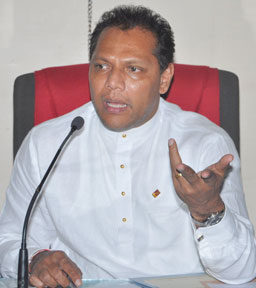Sports Minister to help prepare Lanka for next Olympics
By our correspondent from Rio
Sports Minister Dayasiri Jayasekera is ready to make an investment
for Sri Lanka sport so that the country could produce more Olympians and
send a strong contingent for the 2020 summer Games. He will soon have
discussions with all relevant parties to get suggestions before
implementing a solid program so that Sri Lanka could make its presence
felt at Tokyo 2020 Games.
"We will give every possible support and encouragement for sportsmen
so that we could do well at future international events," the Minister
said. Some of the Lankan Olympians have already told their grievances as
well as suggestions to the Minister in Rio.
|

Sports Minister Dayasiri Jayasekara |
Views of the national sports associations as well as top level
sportsmen would be obtained before drafting a result-oriented program
that would groom more sportsmen and women to gain qualifying standards
for the next summer Games in the Japanese capital.
Sri Lanka painted a dismal picture at the recently-concluded 2016
Olympic Games in Rio de Janeiro. Minister Jayasekera who was in Rio and
got first-hand experience, is ready to embark on an ambitious program
that would enable Sri Lanka to send a contingent of around 25 members
for the 2020 Olympic Games.
Sri Lanka's future medal prospects in regional South Asian Games as
well as in global events such as Asian Games, Commonwealth Games as well
as Olympic Games would be identified to form a national super pool as an
investment for the future.
The main aim of the program is to implement an organized training
program for the national poolists as well as to reach for young talent
to be included in a development pool which could be used as a feeder
pool for the national super pool of sportsmen and women in Olympic
sports.
There are no short cuts in sport, be it at national level or a global
event of the highest magnitude such as the Olympic Games. It is the hard
work, dedication and devotion, coupled with talent and immense
sacrifices that would produce an Olympic medallist. The best example is
former sprint queen Susanthika Jayasinghe who won the women's 200m
silver medal at the Sydney 2000 Olympic Games.
When talking about making an investment for the future to produce
Olympic medallists, the best example in recent times comes from Great
Britain. When the British Olympians returned to London from Atlanta,
United Sates 20 years ago, they were branded as the "team of shame". The
British media went to town with severe criticism on its Olympic Games
contingent for 1996 centenary summer Olympics.
They managed to win a solitary gold medal at the 1996 Summer Games in
Atlanta and secured only the 36th position in the final medal table,
finishing even below less fancied teams such as Kazakhstan, Algeria and
Ireland.
But the Team GB returned to London from Rio de Janeiro last week
after the 2016 Olympic Games with their heads high after becoming the
second power in world sport behind the United States. Britain pocketed a
record 27 gold medals to finish second in the final medals standings,
behind only the United States' 46. Most importantly, they were able to
go past the table leaders of the last London 2012 Games China, which
managed to secure only 26 gold medals.
Great Britain's gold haul in Rio was higher than the country's
combined gold medal total won from the six Games from 1976 to 1996, and
the highest tally it has ever recorded in an Olympics outside home soil.
Its huge investment on sport is now bearing fruit at the highest level -
10th in medals in Sydney 2000 and Athens 2004, fourth in Beijing 2008,
third in London 2012 and now second in Rio 2016.
After its pathetic performance at the 1996 Atlanta Olympics, Great
Britain decided to invest funds raised from the national lottery into
elite sports, to improve the country's prospects of performing well in
the Games. Today, nearly three fourth of Britain's funding on Olympic
pools comes from the national lottery, although its government spending
has been curtailed since 2008. Britain's funding for summer Olympic
sports has risen to 350 million British pounds in 2016 from a mere 59
British pounds in 1996. Similarly, grants for the medal-winning British
athletes have risen from USD 5,200 a year in 1996 to USD 37,000 at
present. Sri Lanka could take a cue from the British initiative.
In mid 90s former Sports Minister S.B. Dissanayake initiated the
country's medal search with an Olympic super pool by generating funds
from the private sector. In less than five years' time, Sri Lanka
produced an Olympic silver medalist! Hence, the future for Sri Lanka in
Olympic will not be bleak, if we make the right investment with an
ambitious program that would bear fruit by 2024 Games.
|

